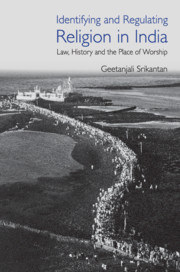Book contents
- Frontmatter
- Contents
- Acknowledgements
- Introduction
- 1 Secularisation and Theologisation: The Making of ‘Hindu Law’ and British Colonialism
- 2 The Role of Legal Hermeneutics as Secularisation in the Formation of Anglo-Muhammadan Law
- 3 Influences and Confluences: The Theological Foundations of Western Property Law and the Place of Worship in India
- 4 Identifying ‘Doctrine’: Tracing Theologisation in Legal Narratives of the Place of Worship in India
- 5 Rethinking Definitions: Hinduism as Religion in the Indian Supreme Court
- Conclusion
- Glossary
- List of Cases
- Bibliography
- Index
2 - The Role of Legal Hermeneutics as Secularisation in the Formation of Anglo-Muhammadan Law
Published online by Cambridge University Press: 30 April 2020
- Frontmatter
- Contents
- Acknowledgements
- Introduction
- 1 Secularisation and Theologisation: The Making of ‘Hindu Law’ and British Colonialism
- 2 The Role of Legal Hermeneutics as Secularisation in the Formation of Anglo-Muhammadan Law
- 3 Influences and Confluences: The Theological Foundations of Western Property Law and the Place of Worship in India
- 4 Identifying ‘Doctrine’: Tracing Theologisation in Legal Narratives of the Place of Worship in India
- 5 Rethinking Definitions: Hinduism as Religion in the Indian Supreme Court
- Conclusion
- Glossary
- List of Cases
- Bibliography
- Index
Summary
Two systems of law more diametrically opposed to each other than the Muhammadan and the Hindu it would be difficult to conceive. Where in the latter there is found a pedantic division into castes, the former proclaims the absolute equality of all persons above the condition of slavery. Any aristocracy that can be said to exist is one of office, there being no hereditary distinctions of rank, except perhaps that attaching to the sovereign, which, however does not seem to have been recognised in the primitive type of Moslem government. Neither is their state hierarchy. Whatever priesthood exists owes its origin rather to individual piety, and private munificence, than to state endowment.
—A Manual of Hindu and Muhammadan Law as Administered in British India Adapted to the Use of Candidates for Her Majesty's India Civil Service (Houston 1863)Introduction: Colonial Inheritances
These statements made in a textbook for examinations on Hindu and Muhammadan law for entry into the British Civil Service reflect the administrative difficulties that the British had in approaching the governance of religious communities that they had identified. As the textbook itself remarks the adherence to their policy of non-interference in religion meant upholding the codes of law of Hindu and Muhammadan communities and this could not be done without reservations. Such reservations reflected in the statements made above reflect concerns of governance, that is, what are the nature and sources of political power. However, the question of governance was not merely that of political power, but also social categories where facts were required to fit theory. In approaching Muhammadan law, the candidate for civil service examinations is cautioned to remember that ‘the law is characterised by a strenuous effort to promote good faith and generous dealing’. However, ‘the standard of morality is too high’ and there is ‘evasion of its Utopian provisions’. Law has not served its purpose in the characterisation of criminal law ‘which is excessively humane and while discountenancing revenge has encouraged aggression’.
In learning about Muhammadan law, social facts such as the low position of women are important (various stipulations in respect to marriage and divorce are cited).
- Type
- Chapter
- Information
- Identifying and Regulating Religion in IndiaLaw, History and the Place of Worship, pp. 62 - 92Publisher: Cambridge University PressPrint publication year: 2020



